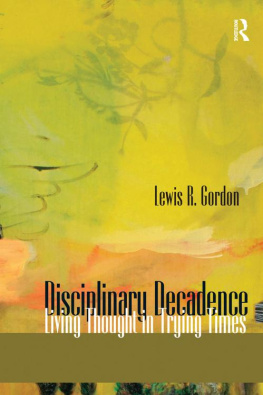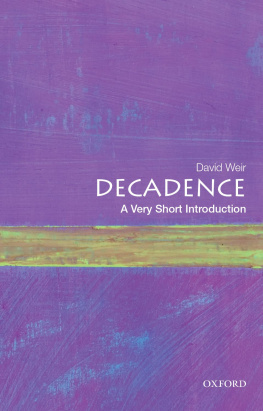Lewis R. Gordon - Disciplinary Decadence
Here you can read online Lewis R. Gordon - Disciplinary Decadence full text of the book (entire story) in english for free. Download pdf and epub, get meaning, cover and reviews about this ebook. year: 2015, publisher: Routledge, genre: Politics. Description of the work, (preface) as well as reviews are available. Best literature library LitArk.com created for fans of good reading and offers a wide selection of genres:
Romance novel
Science fiction
Adventure
Detective
Science
History
Home and family
Prose
Art
Politics
Computer
Non-fiction
Religion
Business
Children
Humor
Choose a favorite category and find really read worthwhile books. Enjoy immersion in the world of imagination, feel the emotions of the characters or learn something new for yourself, make an fascinating discovery.
- Book:Disciplinary Decadence
- Author:
- Publisher:Routledge
- Genre:
- Year:2015
- Rating:3 / 5
- Favourites:Add to favourites
- Your mark:
- 60
- 1
- 2
- 3
- 4
- 5
Disciplinary Decadence: summary, description and annotation
We offer to read an annotation, description, summary or preface (depends on what the author of the book "Disciplinary Decadence" wrote himself). If you haven't found the necessary information about the book — write in the comments, we will try to find it.
Disciplinary Decadence — read online for free the complete book (whole text) full work
Below is the text of the book, divided by pages. System saving the place of the last page read, allows you to conveniently read the book "Disciplinary Decadence" online for free, without having to search again every time where you left off. Put a bookmark, and you can go to the page where you finished reading at any time.
Font size:
Interval:
Bookmark:
Disciplinary Decadence
Edited by Henry A. Giroux and Stanley Aronowitz
Now Available
Beyond the Spectacle of Terrorism: Global Uncertainty and the Challenge of the New Media
by Henry A. Giroux
Left Turn: Forging a New Political Future
by Stanley Aronowitz
Afromodernity: How Europe Is Evolving toward Africa
by Jean Comaroff and John L. Comaroff
Disciplinary Decadence: Living Thought in Trying Times
by Lewis R. Gordon
Living Thought in Trying Times
Lewis R. Gordon

First published 2006
by Paradigm Publishers
Published 2016
by Routledge
2 Park Square, Milton Park, Abingdon, Oxon OX14 4RN
711 Third Avenue, New York, NY 10017, USA
Routledge is an imprint of the Taylor & Francis Group, an informa business
Copyright 2006, Taylor & Francis.
All rights reserved. No part of this book may be reprinted or reproduced or utilised in any form or by any electronic, mechanical, or other means, now known or hereafter invented, including photocopying and recording, or in any information storage or retrieval system, without permission in writing from the publishers.
Notice:
Product or corporate names may be trademarks or registered trademarks, and are used only for identification and explanation without intent to infringe.
Library of Congress Cataloging-in-Publication Data
Gordon, Lewis R. (Lewis Ricardo), 1962
Disciplinary decadence: living thought in trying times / Lewis R. Gordon.
p. cm.
Includes bibliographical references and index.
ISBN-13: 978-1-59451-255-1 (hardcover: alk. paper)
ISBN-10: 1-59451-255-8 (hardcover: alk. paper)
1. Discipline. 2. Degeneration. I. Title.
BJ1533.D49G67 2006
128dc22
2006007764
Designed and Typeset by Straight Creek Bookmakers.
ISBN 13: 978-1-59451-255-1 (hbk)
ISBN 13: 978-1-59451-256-8 (pbk)
To Paget Henry, who has always understood....
The ideas for these chapters were presented in a variety of conferences and colloquia from which they benefited greatly from the critical feedback from my copresenters and the audiences. They include the American Sociological Association in spring 2000; the Rethinking Caribbean Cultural Studies conference at the University of the West Indies at Cave Hill, Barbados, in 2001; the African Studies Colloquium at the University of Illinois at Urbana-Champaign in 2003; the Humanities Center at Temple University during fall 2003; and, in 20042005, at the Dean Humanities Symposium on Inter-disciplinarity at the School of Liberal Arts, Florida Atlantic University, the World Systems conferences (2004 and 2005) at the University of California at Berkeley, the Phenomenology Roundtable meeting at Purdue University, the inaugural meeting of the Caribbean Philosophical Association in Christ Church, Barbados, the Philosophy Department of the University of New South Wales, Australia, the Graduate Department of Education at Miami University at Oxford, Ohio, the Thirtieth-Anniversary Conference of African American Studies at Purdue University, the Institute for African-American Studies at Columbia University, the Philosophy Born of Struggle Society, the Making Democracy Work conference at Independence Hall, Philadelphia, the Escuela Nacional de Antropologa e Historia in Mexico City, and a special project with the Council for the Development of Social Science Research in Africa. I here formally thank the organizers of those events for their generosity and the audiences for the kindness of offering my work the respect of their criticism. I here also formally thank Susan Giroux, who turned out to be the referee for this book, for her many insightful criticisms and suggestions. Thanks, as well, to the young intellectuals at Temple with whom I have shared many Shabbat meals and discussions: Walter Isaac, Qrescent Mason, Frank Castro, Devon Johnson, Hien Thu Luong, Lior Levy, Kaila Story, Yaba Amgborale Blay, Greg Graham, and Tom Meyer, as well as the crew from the University of Pennsylvania: Amel F. Ahmed, Chaz and
Lia Howard; thanks to Doug Ficek, for reading through an early version of this manuscript and to Nelson Maldonado-Torres, Marilyn Nissim-Sabat, Natalija Miunovi, Kenneth Knies, Tom Meyer, and Neil Roberts for doing the same. Special thanks to Joan Jasak, my trusted research assistant and friend for all she has done toward this project and the many we have taken on at the Institute for the Study of Race and Social Thought and the Center for Afro-Jewish Studies at Temple University. And thanks to Dina Solomon for the many hours of conversation while I worked away on the final stages of this work.
Nothing I have written since 1997 has made its way to print without input from my main interlocutors Paget Henry and my beloved wife, Jane. We have been through so much together, including the recent tumultuous year of 2004, marked by the tragic death of my mother on its tenth day and my fathers death ten days before its end. To Jane and our children Mathieu, Jenny, Sula, and Elijah, I do not want to know of a world without you. I know you share my joy in presenting this text to our ever-wonderful and erudite Uncle Paget.
Disciplinary Decadence
There is a knowledge that presumptuously wants to introduce into the world of spirit the same law of indifference under which the external world sighs.
Sren Kierkegaard, Fear and Trembling
Ours is essentially a tragic age, so we refuse to take it tragically. The cataclysm has happened, we are among the ruins, we start to build up new little habitats, to have new little hopes. It is rather hard work: there is now no smooth road into the future: but we go round, or scramble over the obstacles. Weve got to live, no matter how many skies have fallen.
D. H. Lawrence, Lady Chatterleys Lover
Sren Kierkegaard and D. H. Lawrence were men who lived in and wrote with insight on the same condition in different ways. While the former experienced fear and trembling, dread, and the threat of despair, the latter looked into the eyes of adult pleasures and their sensibilities and understood the importance of dying without regrets. Yet both speak to us at profound poles of an age that is accelerating, it seems, to the end of us all. Even if that point of collision proves not to be the end of being alive, it haunts the present with the possibility of few of us ever having lived.
I begin this book with these quotations to examine what might at first appear to be quite mundane: the decaying tendencies in recent attitudes toward the study of human beings. These tendencies have been symptomatic, as the wise have informed us, of various crises of the human spirit in our time. Nestled among them is the one of knowledge, and where a crisis of knowledge emerges, there are three classic retreats. The first is toward a form of naturalism that subordinates thinking to the natural sciences. The second is a retreat into historicism, in which there is believed to be the possibility of emerging rigorous because of an ultimate appeal to facts, albeit often of the textual form of an archive or a documented event. When those two fail, the last retreat seems to be language itself until amnesia sets in and the process of searching for objectivity begins anew and the process recurs. Much of this is familiar to many of us in the academy. As Karl Jaspers showed in Way to Wisdom (1951), there are moments in which even philosophy attempts to show how scientific, as in natural scientific, it can be and, failing to achieve that, to demonstrate how supportive of scientific developments it can be, as, in effect, the backup chorus to science. At the other extreme is the growing role of intellectual history not only in certain philosophical circles, such as European Continental philosophy, but also in such fields as English, political science, and cultural anthropology, where the effort to imitate philosophy often collapses into variations of intellectual history. And the recent poststructural craze, whether through Derridian deconstruction or Foucauldian archaeology and genealogy, exemplifies the retreat into the formalism of language, at times under the auspice of its radical, symbolic, or semiological appeals.
Font size:
Interval:
Bookmark:
Similar books «Disciplinary Decadence»
Look at similar books to Disciplinary Decadence. We have selected literature similar in name and meaning in the hope of providing readers with more options to find new, interesting, not yet read works.
Discussion, reviews of the book Disciplinary Decadence and just readers' own opinions. Leave your comments, write what you think about the work, its meaning or the main characters. Specify what exactly you liked and what you didn't like, and why you think so.








